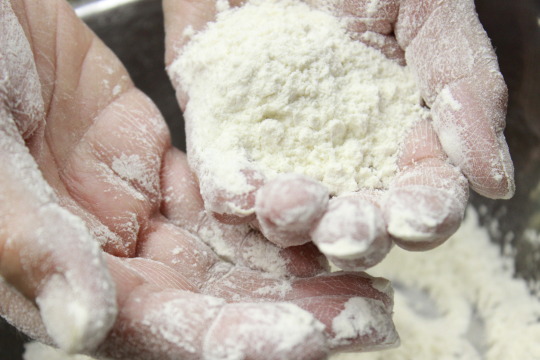By Jean Okamoto

The author’s mother’s hands.
My mother hated udon. She said it was because of the gluten that gave her headaches, but it was really because it was Japanese. It used to be her very favorite food. She would beg Bachan to make it when she was growing up. But after Pearl Harbor, suddenly being Japanese American meant that you were on the wrong side. My mother was sent to the camps and then to New Jersey, always further and further away from that little house in Los Angeles, and suddenly udon gave her headaches.
Not that she ever told me much about this. I learned about the camps from my Bachan, my mother’s mother who stayed with us for half of every winter and told us stories of barbed wire and dust storms, of how outsiders’ fear created a community of those on the inside. My mother became even more silent about this when Bachan stayed with us, magnified by Bachan’s pride about being Japanese and her desire to show us the victory in the loss and the redemption in the lives of the children. In us.
I was eight when I caught sight of my mother’s face during one of these grand storytelling moments. I couldn’t read what her eyes were saying then. I couldn’t hear past her silences. It was only later, after my father had passed away, my eldest brother had moved across the Pacific, and my best friend’s baby girl had stopped breathing – it was only after I looked into the mirror and saw it in my own eyes that I could recognize the loss in hers. And it was only much later, after I had children of my own, that I began to grasp what she was trying to protect us from, why we never moved back to California, why our cousins all had middle names like Keiko and Aiko and Kimi while mine was just Joy.
Bachan told me that America had stolen from both her and my mother, but that my mother had lost much more. She never said she was sad or disappointed or hurt when my mother refused to ever eat udon again. But when Bachan stayed with us and my mother had work or meetings and didn’t have time to cook dinner, we ate homemade udon. And we loved it.
Bachan taught me how to make udon once when I was young, one bright winter afternoon, light bouncing off the scrubbed wooden table and catching the deep wrinkles of her hands. I asked her that day if she could be my mother instead. Her love was easier for me to understand. But she just laughed and said my mother needed me too much. It was the answer you give a child, but there was some buried truth within. I didn’t understand then. I still don’t know if I understand everything she had to teach me, the deep wisdoms of those softly lit afternoons and our flour-covered hands.
Bachan loved udon. I made it for her wake. It wasn’t exactly traditional, not for a funeral. I knew Bachan didn’t care much about things like that. Funerals are for the living, she told me near the end. When you come to see me in that wooden box, I won’t be there anymore. So it wasn’t that I was making the udon for her. I was making it for us. To remember her.
My six year-old Jessie creeps into the room and peers over the edge of the counter where I am kneading the stiff dough, turning it over and over until it becomes malleable, soft but strong. Udon is her favorite, too, despite my imperfect technique, my uneven noodles. And someday soon it will be time to teach her this recipe – passed down to me – of patience and redemption, of bending but not breaking. Of remembering.
About the Author: Jean Akemi Okamoto is a fourth-generation Japanese American currently studying at UCLA. Her creative works, both film and writing, are influenced by her family, faith, and (usually) food.
